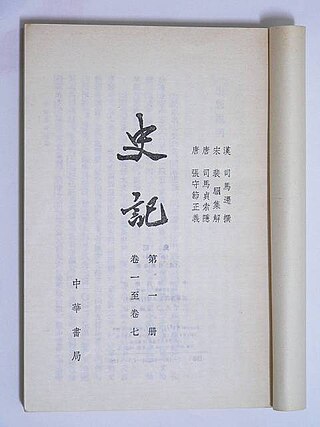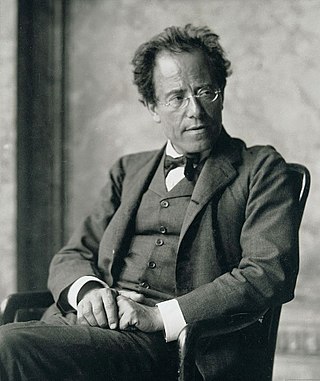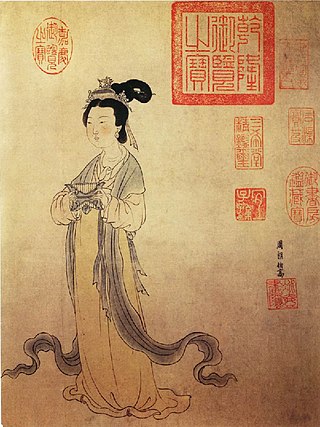
Li Bai, also pronounced as Li Bo, courtesy name Taibai, was a Chinese poet, acclaimed from his own time to the present as one of the greatest and most important poets of the Tang dynasty and in Chinese history as a whole. He and his friend Du Fu (712–770) were two of the most prominent figures in the flourishing of Chinese poetry under the Tang dynasty, which is often called the "Golden Age of Chinese Poetry". The expression "Three Wonders" denotes Li Bai's poetry, Pei Min's swordplay, and Zhang Xu's calligraphy.

Records of the Grand Historian, also known by its Chinese name Shiji, is a monumental history of China that is the first of China's 24 dynastic histories. The Records was written in the late 2nd century BC to early 1st century BC by the ancient Chinese historian Sima Qian, whose father Sima Tan had begun it several decades earlier. The work covers a 2,500-year period from the age of the legendary Yellow Emperor to the reign of Emperor Wu of Han in the author's own time, and describes the world as it was known to the Chinese of the Western Han dynasty.

Wang Wei (699–759) was a Chinese musician, painter, poet, and politician of the middle Tang dynasty. He is regarded as one of the most famous men of arts and letters of his era. Many of his poems survive and 29 of them are included in the 18th-century anthology Three Hundred Tang Poems. Many of his best poems were inspired by the local landscape.

Das Lied von der Erde is an orchestral song cycle for two voices and orchestra written by Gustav Mahler between 1908 and 1909. Described as a symphony when published, it comprises six songs for two singers who alternate movements. Mahler specified that the two singers should be a tenor and an alto, or else a tenor and a baritone if an alto is not available. Mahler composed this work following the most painful period in his life, and the songs address themes such as those of living, parting and salvation. On the centenary of Mahler's birth, the composer and prominent Mahler conductor Leonard Bernstein described Das Lied von der Erde as Mahler's "greatest symphony". As with his later Symphony No. 9, Mahler did not live to hear Das Lied von der Erde performed.
The Lu Xun Literary Prize 鲁迅文学奖 is a literary prize awarded by China Writers Association. It is one of China's top four literary prizes and is named after Lu Xun and has been awarded every three years since 1995. Its predecessor, the National Outstanding Short Story Award and National Outstanding Novella Award, was established since the beginning of the new-era literature in the early 1980s.
Zuo Qiuming, Zuoqiu Ming or Qiu Ming was a Chinese historian who was a contemporary of Confucius. He lived in the State of Lu during the Spring and Autumn period. He was a historian, litterateur, thinker and essayist who worked as a Lu official.

Zhang Ji, courtesy name Yisun (懿孙), was a Chinese poet born in Xiangyang during the Tang dynasty.
The Three Hundred Tang Poems is an anthology of poems from the Chinese Tang dynasty (618–907). It was first compiled around 1763 by Sun Zhu (1722–1778), who was a Qing Dynasty scholar and was also known as Hengtang Tuishi. Various later editions also exist. All editions contain slightly more than 300 total poems. The number 300 was a classic number for a poetry collection due to the influence of the Classic of Poetry, which was generally known as The Three Hundred Poems.
The Book of Chen or Chen Shu was the official history of the Chen dynasty, one of the Southern Dynasties of China. The Book of Chen is part of the official Twenty-Four Histories of imperial China. It was compiled by the Tang dynasty historian Yao Silian and completed in 636 AD. The Chen Shu is a biographical history book with thirty-six volumes, recording the historical facts of 33 years from the accession of Chen Baxian to the last emperor Chen Shubao.

Hans Bethge was a German poet whose reputation abroad rests above all on the versions of the Tang dynasty poetry set in Mahler's Das Lied von der Erde. The Max Eyth House in Kirchheim unter Teck houses a permanent exhibit of Hans Bethge's books, photographs and other artifacts, while his manuscripts are preserved at the Deutsches Literaturarchiv Marbach.

Josef Venantius von Wöss was a Viennese church musician, composer, teacher of harmony and music publishing lector. He is known for piano transcriptions of large-scale works by Gustav Mahler for Universal Edition.
Wei Yingwu , courtesy name Yibo (義博), art name Xizhai (西齋), was a Chinese poet of the Tang dynasty. Twelve of Wei Yingwu's poems were included in the influential Three Hundred Tang Poems anthology. He was also known by his honorific name Wei Suzhou (韋蘇州), which was bestowed upon him as a result of his service as the governor of Suzhou.
Qian Qi was a Chinese poet of the Tang dynasty. Three of his poems have been included within the famous anthology Three Hundred Tang Poems. His courtesy name was Zhongwen.

Lai, also known as Láiyí (萊夷), was an ancient Dongyi state located in what is now eastern Shandong Province, recorded in the Book of Xia. Tang Shanchun (唐善纯) believes lái means "mountain" in the ancient Yue language (古越语), while the Yue Jue Shu (越絕書) says lai means "wilderness".
Qian Chunqi was a Chinese doctor and translator who won the Lu Xun Literary Prize (1996), a prestigious literary award in China.

The Song of the Earth is a ballet based on Das Lied von der Erde, a symphonic work written by the Austrian composer Gustav Mahler in 1908–1909. It is scored for two voices and orchestra, and has been used for ballets by several well-known choreographers, including Antony Tudor (1908–1987), Kenneth MacMillan (1929–1992), Heinz Spoerli, and John Neumeier.
Songs from the Chinese is a song cycle for soprano or tenor and guitar composed in 1957 by Benjamin Britten (1913–76), and published as his Op. 58. It consists of settings of six poems translated from the original Chinese by Arthur Waley (1889–1966). It was written for, and first performed by, the tenor Peter Pears and the guitarist Julian Bream.
The National Outstanding Children's Literature Award is a major literary award in China, established in 1986. It is run by the China Writers Association, and is awarded every three years in the categories of novels, picture books, poetry, essays and non-fiction.

Du Qiuniang or Lady Du Qiu was a Tang dynasty Chinese poet. She is the only female poet to be included in the famous anthology Three Hundred Tang Poems.
Xu Jian, also known as Xu Yuangu, was a literary figure from the Tang dynasty. He is the author of "the Great Hidden Biography" and "the Beginning of Learning Records".










